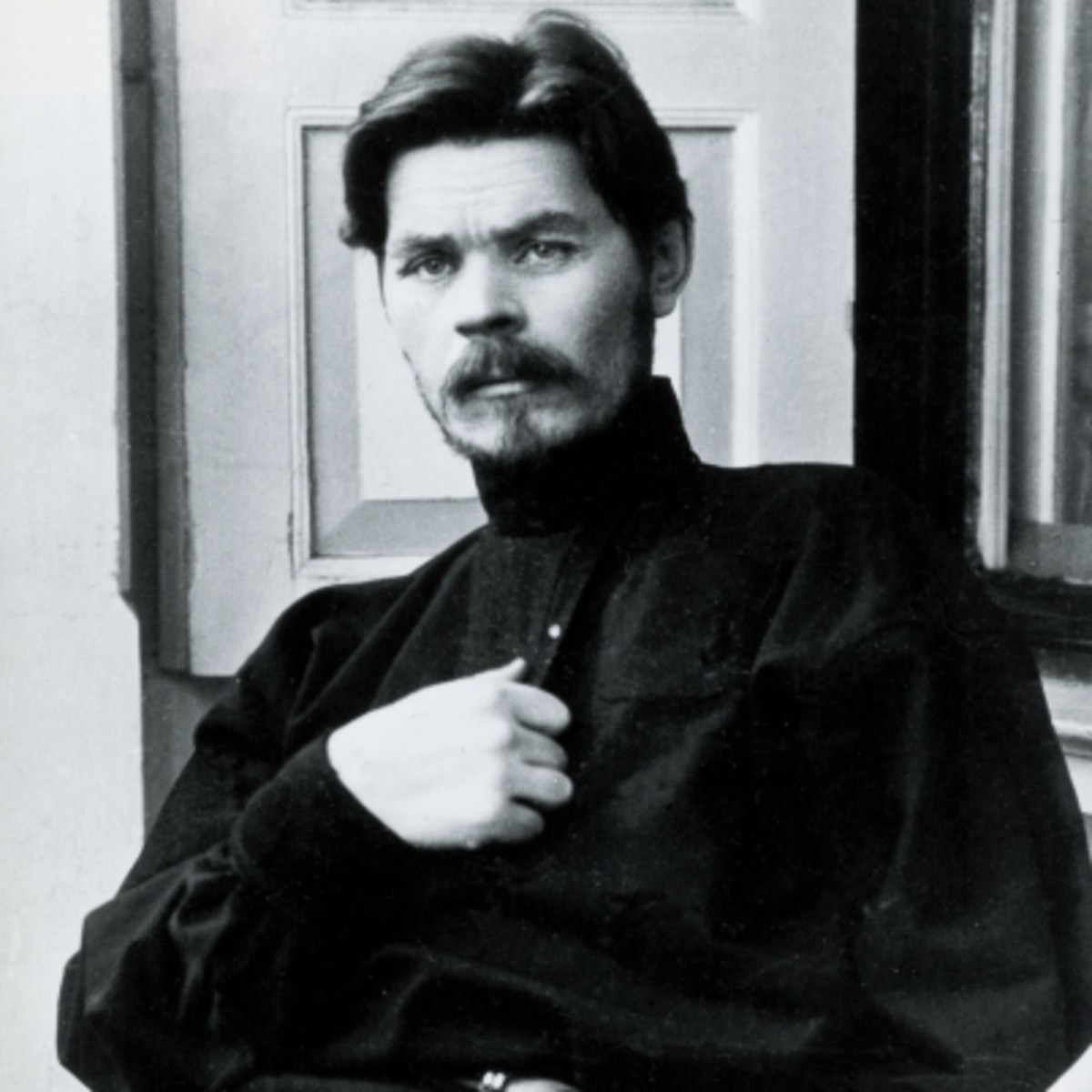Jazz is one of the Western styles which appear on Bone Records and of course was the most popular one amongst the youth group The Stilyagi but the complex story of Jazz in the Soviet Union cannot be easily summed up. The party line on it varied considerably through the decades from the relatively tolerant 1920s to the brutal era of the late 1940s. (The best book on the subject is probably S. Frederick Starr's Red and Hot: The Fate of Jazz in the Soviet Union 1917-1991 ).
Attitudes hardened and became much more punitive after writer and Socialist Realist ideologue Maxim Gorky published his piece "The Music of the Gross" in 1928.
Maxim Gorky
"There are rumblings, wails and howls like the smarting of a metal pig, the shriek of a donkey, or the amorous croaking of a monstrous frog. Bestial cries are heard, neighing horses, wild screaming, hissing, rattling, wailing, moaning, cackling. The insulting chaos of insanity pulses to a throbbing rhythm. Listening to this screaming music for a few minutes , one involuntarily imagines an orchestra of sexual maniacs led by a man-stallion beating time with an enormous phallus. The monstrous bass belches our English words; a wild horn wails piercingly, calling to mind the cries of a raving camel; a drum pounds monotonously; a nasty little pipe tears at ones ears; a saxophone emits its quacking nasal sound. Fleshy hips sway, and thousands of heavy feet tread and shuffle. The music of the degenerate ends finally with a deafening thud, as though a case of pottery had been flung down from the skies."
In Gorky's inflamed rhetoric, it is difficult to separate out any objection to the specific styles and sounds of jazz from a general prejudice against Western music or music which made young people want to dance or have sex rather than work. Improvisation and complexity were of course frowned on as being 'formalistic' and judged as being incomprehensible to the common man or woman.
But at different times, jazz was tolerated - particularly the more polite, light, cocktail styles - and of course there were some noted Soviet Jazz musicians or musicians who played in more swing styles such as Eddie Rosner**. During the second world war, when the US , Britain and the Soviet Union were allies, it was even possible to watch American films with jazz soundtracks in Moscow and St Petersburg and to hear Western tunes on the radio, a brief period of detente which provoked the hunger for such music in a subsequent generation of young music lovers. But later there were again brutal repressions with musicians being pulled from stages and imprisoned. Rosner himself spent time in a Gulag was lucky to survive.
Strangely, it seems totalitarian regimes from all ends of the political spectrum have shared similar objections to jazz. According to Czech writer and dissident Josef Skvorecky, a tenor saxophone player living in Third Reich-occupied Czechoslovakia, the Nazis took a similar line to the Soviet ideologues. In the introduction to his novel The Bass Saxophone, he recalls ten regulations issued by a certain Gauleiter, a Nazi official, to control the performance of the local dance orchestras during the Czech occupation:
Eddie Rosner
- Pieces in foxtrot rhythm (so-called swing) are not to exceed 20% of the repertoires of light orchestras and dance bands;
- In this so-called jazz type repertoire, preference is to be given to compositions in a major key and to lyrics expressing joy in life rather than Jewishly gloomy lyrics;
- As to tempo, preference is also to be given to brisk compositions over slow ones so-called blues); however, the pace must not exceed a certain degree of allegro, commensurate with the Aryan sense of discipline and moderation. On no account will Negroid excesses in tempo (so-called hot jazz) or in solo performances (so-called breaks) be tolerated;
- So-called jazz compositions may contain at most 10% syncopation; the remainder must consist of a natural legato movement devoid of the hysterical rhythmic reverses characteristic of the barbarian races and conductive to dark instincts alien to the German people (so-called riffs);
- Strictly prohibited is the use of instruments alien to the German spirit (so-called cowbells, flexatone, brushes, etc.) as well as all mutes which turn the noble sound of wind and brass instruments into a Jewish-Freemasonic yowl (so-called wa-wa, hat, etc.);
- Also prohibited are so-called drum breaks longer than half a bar in four-quarter beat (except in stylized military marches);
- The double bass must be played solely with the bow in so-called jazz compositions;
- Plucking of the strings is prohibited, since it is damaging to the instrument and detrimental to Aryan musicality; if a so-called pizzicato effect is absolutely desirable for the character of the composition, strict care must be taken lest the string be allowed to patter on the sordine, which is henceforth forbidden;
- Musicians are likewise forbidden to make vocal improvisations (so-called scat);
- All light orchestras and dance bands are advised to restrict the use of saxophones of all keys and to substitute for them the violin-cello, the viola or possibly a suitable folk instrument.
Gorky would have approved.
** Adolph Ignatievich Rosner, also known as Eddie Rosner (1910 - 1976) was a Polish and Soviet Jazz musician called "The White Louis Armstrong". This is in part because of his rendition of the St. Louis blues. He also served as a prisoner in the Gulag prison camp in the former Soviet Union under Joseph Stalin." Wikipedia

